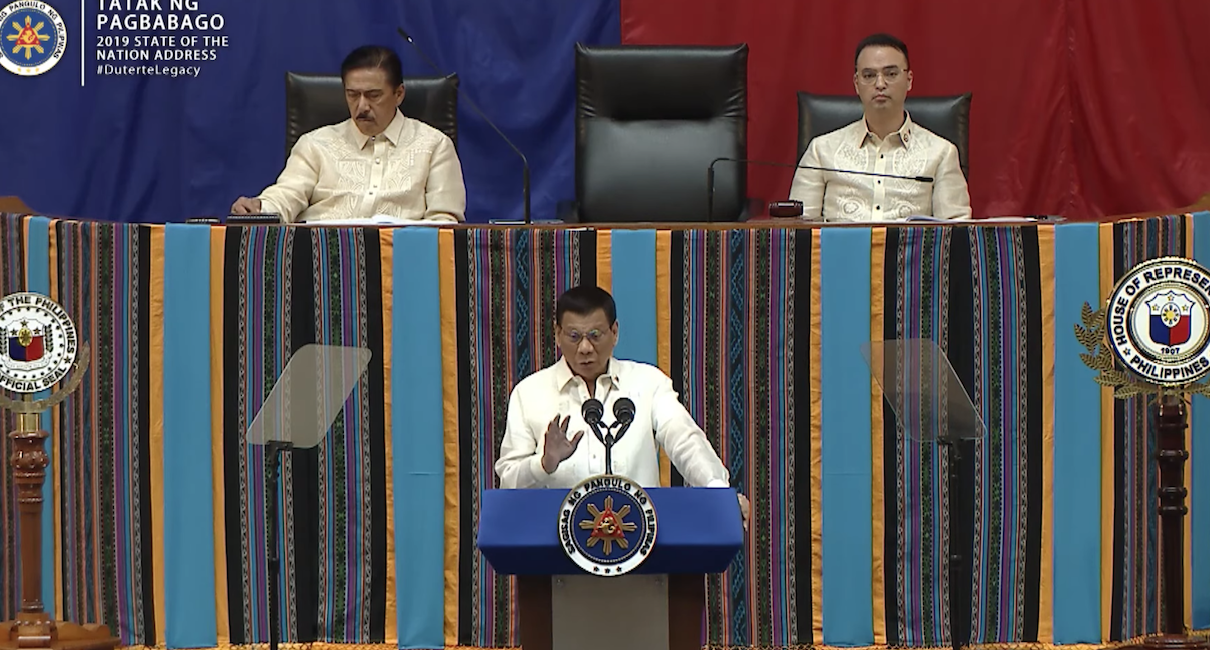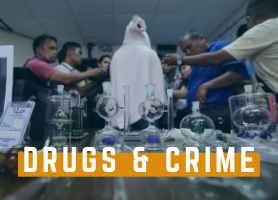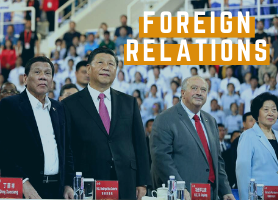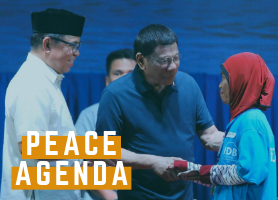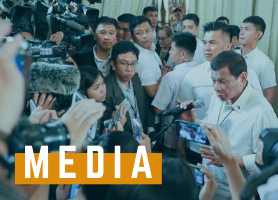President Rodrigo Duterte, expressing grave disappointment that corruption and the drug problem continue despite the government’s relentless campaigns to stop them, has asked the public’s help by being more assertive in fighting these crimes.
In his fourth State of the Nation Address, Duterte told Filipinos to be part of the solution to problems that continue to plague the country. “Be assertive. Make a scene,” he said in order to call attention to corrupt practices in government offices.
He told his audience to expose and investigate anything that is not in accordance with law.
Three years after he took over the helm of the government, he said: “It pains me to say that we have not learned our lesson. The illegal drug problem persists, corruption continues and emasculates the courage we need to sustain our moral recovery.”
Duterte, who enjoys high trust and popularity ratings, said the people are partly to blame for the mess the country is in when he said: “I have identified the enemy who dumped us into the quagmire we are in. I have met the enemy face to face and sadly the enemy is us.”
Calling corruption a national shame, he added: “Catharsis is what we need individually and collectively, not tomorrow, but today. Self-purgation and followed by the resolve to do what is right and proper is good for the nation’s health.”
Despite the setbacks, he declared: “Believe me, I will end my term fighting.”
He called on Congress, most of whose members are political allies and supporters, to reinstate the death penalty for heinous crimes related to drugs and plunder or corruption.
Duterte’s address to the nation half-way through his term, comes two months after administration-backed candidates, including a few personal choices, handily won seats in the Senate and the House of Representatives.
On the Philippines’ territorial conflict with China over the West Philippine Sea, Duterte maintained that the government is not ready for a shooting war with its Asian neighbour, but prefers to resolve it in a peaceful way.
“The avoidance of armed conflict and the protection of our territorial waters and natural resources are what compel us to perform a delicate balancing act,” he said.
“I am not ready or inclined to accept the occurrence of more destruction, more widows, more orphans, should war, even in a limited scale, break out.”
Duterte has been called out by critics for his position in the row over the West Philippine Sea, saying his verbal agreement with Chinese President Xi Jinping allowing fishing by Chinese fishermen within the Philippine exclusive economic zone (EEZ) could be grounds for impeachment.
In his address on Monday, he said: “The arbitral [ruling] even states that the Philippines may enter into fishing agreements with other states provided certain conditions and requisites in the UNCLOS (United Nations Convention on the Law of the Sea) are met.”
The Arbitral Court in the Hague has ruled in favor of the Philippines, saying there was no legal basis for China to claim historic rights to resources within the sea areas falling within the ‘nine-dash line’.
Quoting Scriptures, Duterte said there is a time for everything and referring to its relationship with China over disputed claims over the West Philippine Sea, he said: “There is time to negotiate, and time to quarrel; there is time to antagonize and time to have peace.”
On the environment, Duterte was proud to announce that Boracay, which had been cleaned up after being closed to the public for six months, was just the start, and warned other tourist destinations that pollute the environment.
“There are those who violate environmental rules. I am giving due notice to the local government units, and other stakeholders of tourist destinations to take extra steps in the enforcement of our laws, and the protection of our environment,” he said.
On the environment
Duterte boasted of the government’s six-month closure and continued rehabilitation of Boracay Island which, he said, has been “restored close to its original pristine state.”
The president also urged Congress to pass the National Land Use Act “within this year.” He has been reiterating this since his second SONA in 2017 but to no avail; none of the five Senate bills on national land use moved past the Senate Committee on Environment and Natural Resources in the 17th Congress. A similar bill has been approved by the House of Representatives in May 2017.
Sen. Francis “Kiko” Pangilinan on July 1 filed as one of his pet bills in the 18th Congress the National Land Use Act of 2019.
On social services
While talking about social services, Duterte wrongly claimed that the Philippines has one of the “fastest population growths.” Population data from the World Bank and United Nations show that the country is not even among the top 10 nations with the fastest growth rates.
He also pushed for the passage of two new laws: a revamped Salary Standardization Law, which is set to increase the pay of “government workers, teachers and nurses,” and another creating a Department of Water Resources. Duterte has vowed to increase the pay of teachers since he campaigned for the presidency, but remains to be fulfilled now halfway into his term.
On the armed forces
Duterte also claimed “there are no corrupt (officials) in the military.” However, he himself ordered the relief and urged prosecution for over 20 officials from various Armed Forces of the Philippines medical centers last year over reports of alleged corruption. He has also dismissed a Philippine Military Academy comptroller for supposedly misusing multi million pesos’ worth of cadet funds.
On the West Philippine Sea
Duterte said he was invoking “traditional fishing rights” when he made the fishing agreement with Xi, which, he said, was recognized in the 2016 ruling of the Permanent Court of Arbitration (PCA) favoring the Philippines on the South China Sea dispute.
“It is in that arbitral ruling. Ayaw lang ninyo gustong tignan (You [critics] just don’t want to look at that),” he said.
While traditional fishing rights in the Scarborough Shoal, which is within the Philippine EEZ, were indeed recognized in the PCA decision, it also found that China had “violated its duty to respect to the traditional fishing rights of the Philippine fishermen by halting access to the [Scarborough] Shoal after May 2012.”
Duterte also used the PCA ruling to justify the fishing agreement with China, since giving other states access to the resources in one’s EEZ is allowed by UNCLOS, under certain conditions.
However, Art. 12, Sec. 2 of the Philippine Constitution explicitly states that the government must “reserve” the “use and enjoyment” of the nation’s marine wealth — including those in its EEZ — “exclusively” to Filpino citizens. Under the Philippine Fisheries Code, other States may only be allowed to conduct research and survey activities in the area but still subject to “strict conditions.”
Art. 7, Sec. 21 of the Constitution also says “no treaty or international agreement shall be valid and effective unless concurred in by at least two-thirds of all the Members of the Senate.”
On infrastructure
Duterte boasted the infrastructure projects of his administration, particularly the airports and inter-island transport linkage projects. He particularly mentioned the development of the Davao International Airport (Francisco Bangoy International Airport) and apologized as early as now should the completion of its rehabilitation will not take place under his term.
He also spoke about the traffic decongestion in Metro Manila. He ordered the Interior and Local Government Secretary Eduardo Año to suspend mayors who will not comply with his call to “reclaim” public roads being used for “private ends.” He said that traffic in Metro Manila results in P3.5 billion-worth of economic loss, referencing to the recent study of the Japan International Cooperation Agency.
On peace agenda
Duterte made contradicting statements when he claimed the five-month-long Marawi siege in Mindanao, where he resorted to put the whole island under martial rule even up to now, largely had to do with illegal drugs.
Article VII, Section 18 of the 1987 Constitution allows the president to place the country or any part of it under martial law only in cases of invasion or rebellion, and when public safety requires.
On the economy
Duterte urged Congress to pass the second package of the Comprehensive Tax Reform Program, also known as the Tax Reform for Attracting Better and High-Quality Opportunities or the TRABAHO bill. The measure aims to lower corporate income taxes from 30% to 20% by 2029 and modernize incentives given to businesses.
Duterte also promised to fully implement the rice tariffication law and allocate P10 billion from tariff collections to the Rice Competitiveness Enhancement Fund, which aims to help increase local farmers’ productivity.
Meanwhile, Duterte has changed his position on the coco levy funds — the taxes paid by coconut farmers during Martial law, supposedly for their benefit, but ended up in the hands of the late dictator Ferdinand Marcos and his cronies.
During his campaign, Duterte promised to return the funds worth P100 billion to coconut farmers within his first 100 days in office. But in February, he vetoed the Coconut Farmers and Industry Development Bill because it “may be violative of the Constitution and is lacking safeguards” (See: SONA 2018 Promise Tracker: Economy)
Now, Duterte is proposing to only give P5 billion of the P100 billion-fund to coconut farmers.
He also wants to abolish or reconfigure the Land Bank of the Philippines or Landbank, if it continues to fail in serving the interests of the farmers.
On corruption and governance
Just like what he did in his first three SONAs, Duterte affirmed his fight against corruption, saying that there is “no sacred cow” in his administration. But until now, none of the officials he sacked or resigned had his or her day in court.
Duterte also did not mention anything about charter change or federalism in his SONA. — with reports from Meeko Angela Camba, Jil Danielle Caro, Chi Liquicia, Elijah Roderos, Celine Isabelle Samson, Ivel John M. Santos, Klaire Ting and Reiven Pascasio
